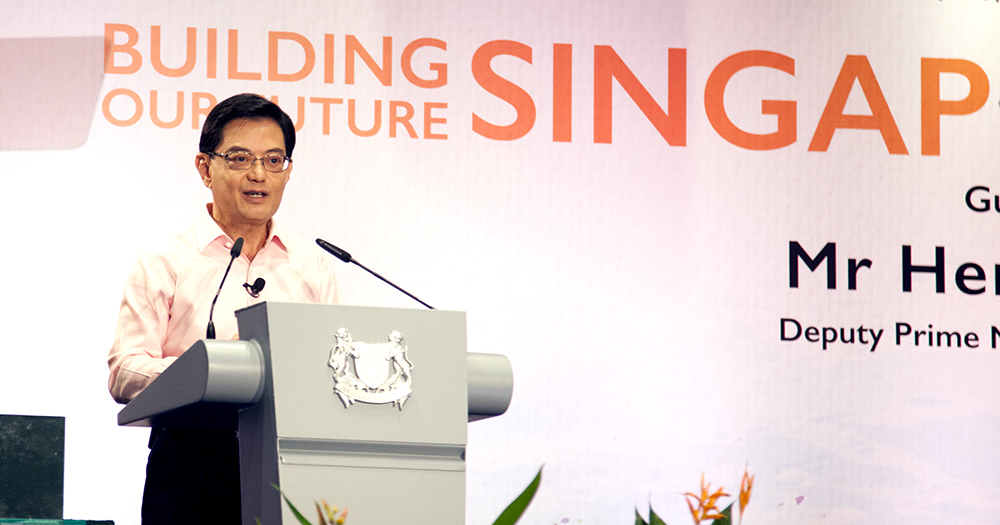On June 15, Deputy Prime Minister Heng Swee Keat announced that the 4G leadership will take on a leading role in partnering Singaporeans more proactively.
Heng said that the government will partner Singaporeans in new ways, at the “Building Our Future Singapore Together” REACH dialogue, held at the Singapore Management University School of Law Hall.
After that, Heng took part in a 90 minute dialogue with the participants.
The participants peppered Heng with questions ranging from the geopolitical climate to politics and taxes. Here are some of the issues Heng addressed :
On how this is different from Our Singapore Conversations
According to Heng, the Our Singapore Conversations (OSC) in 2012 and 2013 was for the government to better understand hopes and aspirations of the people and to provide an opportunity for people to get to know one another better.
"I wasn't sure what it would lead to. it was very open ended," said Heng.
However, Heng's new call for deeper partnership with Singaporeans has two key differences.
Referring to the "democracy of deeds" mentioned in his speech, Heng said this partnership is a "way of getting Singaporeans to not just share views but do things together."
Additionally, as opposed to the OSC, this is a long term partnership.
"I hope to get Singaporeans to think about our long term future," said Heng.
On whether opposition parties have a part to play in this partnership:
The first question from the floor came from a Toa Payoh resident who asked if there were any opposition party members invited to this dialogue.
Echoing the Workers' Party's 2011 manifesto "Towards a First World Parliament", this resident shared that he shares Heng's vision of an active citizenry where a "First World Parliament" is supervised by "First World Citizens".
In response, Heng said that "diversity of views comes from all sources" and while it is important to debate with a diversity of views, Singaporeans cannot have a diversity of purpose.
On Singapore's place in a shifting geopolitical climate:
Gillian Koh, senior fellow from the Institute of Policy Studies, posed two questions to Heng:
- Through the past months, what were his most critical reflections from interactions with foreign powers?
- What would Heng like citizens to understand better so that Team Singapore can succeed and thrive in a changing world?
Explaining that there is a "delicate and complicated situation" between U.S. and China at the moment, Heng said that there can be a lot of misunderstanding when it comes to economic development and what each country should do to adjust to this.
"Every government in the world must want a better life for their people," said Heng.
"Those in the bottom of the value chain must want to move up for their people. Those who are ahead must run faster..." said Heng, adding that Singaporeans must change as the world changes.
In the meantime, Singaporeans must see our multiculturalism as a strength to interact and adapt to the rest of the world.
On whether Singapore will ever choose sides, Heng said that we should stay neutral for as long as we can.
"We should stay neutral for as far as possible... At the end of the day, our action must depend on the long term interests of Singapore."
On improving the public service:
Responding to a question on how the middle management in the public service can echo the values of Heng's 4G leadership, Heng said that the public service is constantly improving.
"Our head civil service has started the public sector transformation programme. There is a very connected effort to continue to improve our public service. We are determined to continue with this effort. Members of public may not see it but I can assure you that there is a lot going on."
On what younger Singaporeans look for in Singapore's leaders:
While leadership styles change as Singapore society matures, Heng said that there are traits which must remain constant.
"Every leader must have the integrity and interest of Singapore and Singaporeans at heart. That is the starting point," said Heng. "The character and motivation of our leaders is fundamental".
On brain drain:
"This is a generational change we are facing...That is why creating opportunities in Singapore is important," said Heng.
He also hopes that young people will see Singapore as "not just a place to earn a living, but a place where [their] family ties are."
On whether consumption tax can be reduced:
"No finance minister wants to increase taxes, it is not an easy decision for me," said Heng. "There are many competing objectives."
Despite that, Singapore has the Net Investments Returns Contribution (NIRC) to help keep consumption tax low.
NIRC comprises of up to 50% of the Net Investment Returns (NIR) on the net assets invested by GIC, MAS and Temasek; and, up to 50% of the Net Investment Income (NII) derived from past reserves from the remaining assets.
Heng added, "the one thing I hope many Singaporeans will appreciate is that the biggest source of our revenue in the last few years is our NIRC."
According to Heng, without this reserve, the GST would be "seven to fifteen percent and not enough".
Top photo via Charis Chan.
If you like what you read, follow us on Facebook, Instagram, Twitter and Telegram to get the latest updates.
